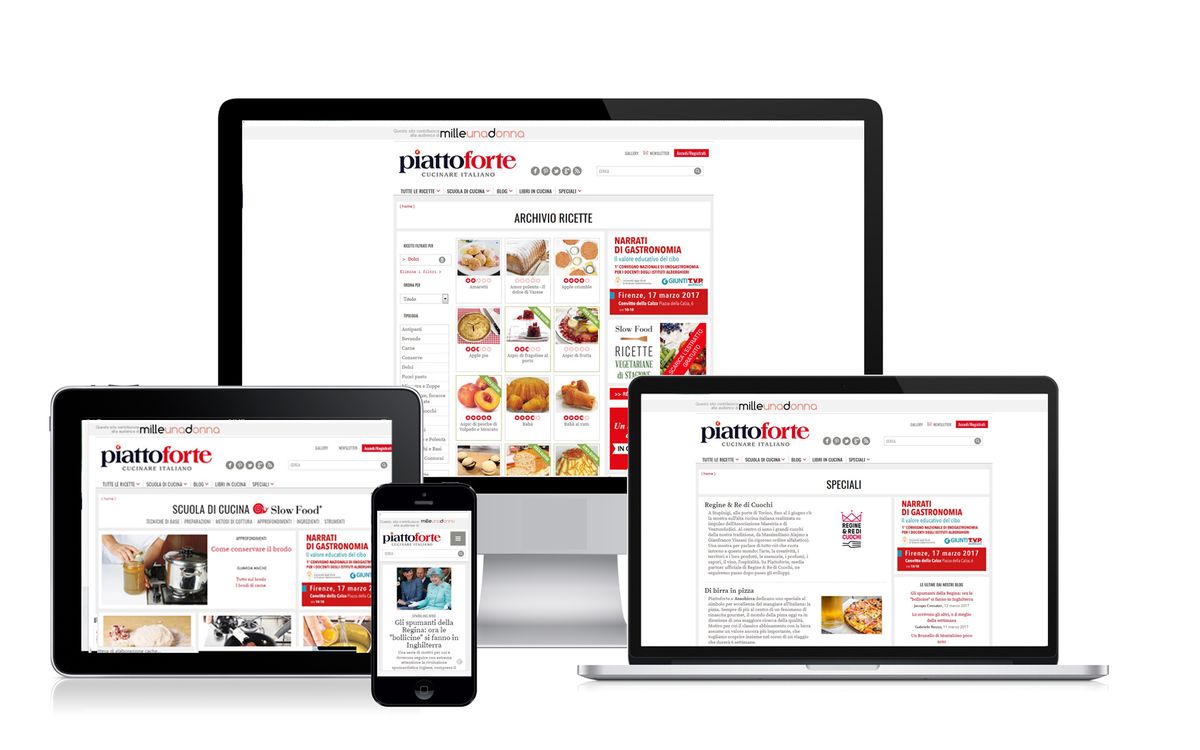Piattoforte - Giunti Editorepiattoforte.it, the enterprise platform for italian community recipes
Piattoforte
Founded in 1841 in Florence, Giunti Editore is one of the oldest publishing houses in Italy. Its interests range from production to promotion, and from distribution to retail sales with the retail chain "Giunti al punto", market leader by points of sale, with 169 company-owned bookstores.
Since 2009, thanks to its capital share in Slow Food s.r.l. and an agreement with the Slow Food Association, it diffuses traditional and regional food culture through a series of cookbooks, and since February 2014 on www.piattoforte.it.
The Project
La Giunti Editore wanted to take advantage of the huge database of recipes it has accumulated over the years through the creation of a portal that could involve a different community than that of its general site. The portal needed to manage a considerable amount of both editorial content and converging and simultaneous requests from community members.
The TYPO3 CMS was chosen to develop a responsive enterprise platform that would be able to manage all the main functionalities for the community, including registering from a social media account, interacting with users who can add their own recipes, creating personal recipe collections and topical blogs with individualized access for each blogger.
Implementation
Due to the great quantity of informations, with numerous internal references and labels, the Piattoforte database is continuously synchronized to ensure that the system can respond instantly to each search. Furthermore, the website supports high levels of visitors thanks to the use of a multi-layer static cache system that is built around a database, RAM, and static files. It is SEO optimized, with algorithms that automatically evaluate the metatags for the URLs produced and the page level metadata.

TYPO3 ready
Content management was implemented by taking advantage of and fully integrating the FAL asset management module and by developing all the extensions in Extbase and Fluid.
Navigation for Aggregate Content
Users can receive tips about the pages to peruse thanks to an algorithm that extracts content that is consistent with the various tags chosen during navigation. The set of tags is determined by the editorial manager, and the various editors choose from that set the appropriate tags to label their own recipes.
Topical Navigation
Each author, editor, or blogger can create combinations of their own and others' content. For example, someone may suggest reading content about a wine that pairs well with their own recipe.
![[Translate to Inglese:] Giunti Editore [Translate to Inglese:] Giunti Editore](https://www.webformat.com/fileadmin/Portfolio/Piattoforte/GIUNTI.png)
A responsive enterprise platform that is able to manage all the main functionalities for one of the best-known recipe communities in Italy: registration via social media accounts, interaction with users, creation of personal recipe collections, and topical blogs with differentiated levels of access.
We also have done
- Auto-publishing
- Gallery
- Cookbooks
- Video ricette
- Opinions and Ratings
- Social login
- Performance optimization

